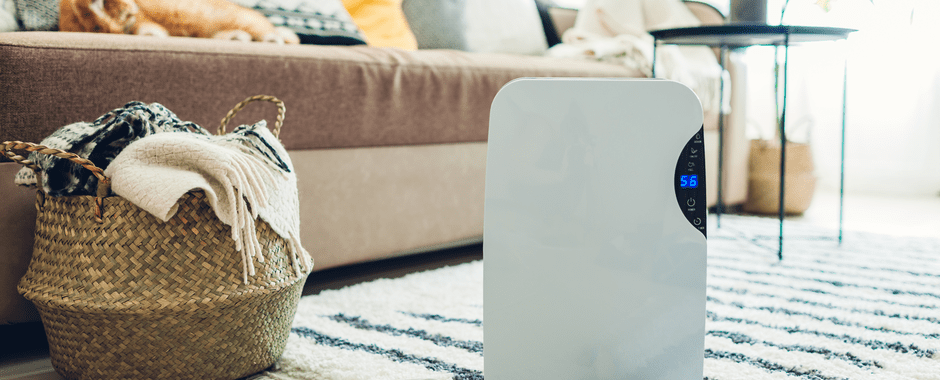Top 5 reasons why dehumidifiers are important
By decreasing humidity in your home, dehumidifiers make a real difference

What does a dehumidifier do? Key tips to remember:
- Dehumidifiers help with allergies and breathing problems
- Dehumidifiers fight the moisture that breeds mold and mildew
- Dehumidifiers come in sizes according to the size of the room
- Dehumidifiers can help your HVAC system run more efficiently and last longer
- Modern dehumidifiers are both quiet and efficient
Wondering how to use a dehumidifier? Before you start searching online for “dehumidifier purpose,” stick around and read more because you’ve found all the information you need. So, what’s a dehumidifier, anyway? A dehumidifier is an in-home appliance, an electrical device approximately the size of a carry-on piece of luggage (or larger) that conditions the air by removing moisture from it. Using a dehumidifier can help you regulate the air's humidity level. Most dehumidifiers are designed to work in a single room and are sized accordingly. However, a whole-house dehumidifier is also an option, and one we discuss more below.
Determining your level of need
If you live in a muggy, humid area, suffer from allergies or asthma, deal with mold or mildew problems, or notice condensation on your windows, you are a prime candidate for a dehumidifier. If you experience more than one of these factors regularly, you may want to consider a whole-house dehumidifier. It’s a significantly more expensive option but worth considering if your home experiences many of these factors all at once. Any dehumidifier can help you regulate your relative humidity for better health and additional benefits inside the home. Keeping your humidity level below 50% is a good general rule.
What does a dehumidifier do?
If we asked you to define what dehumidifiers do, would you be able to? It’s simple: A dehumidifier extracts water from the air that passes through the unit, usually by one of two main processes: condensate or desiccant. The condensate process consists of an electric refrigeration method that pulls air over a refrigerated evaporator with a fan. It extracts water from this air, which is warmed, dehumidified, and released back into the room. The desiccant method uses a humidity-absorbing material that is exposed to the air, then heated to release it without the moisture. Desiccant dehumidifiers are lighter and quieter due to their lack of condensers, but they’re more expensive and best suited for high-humidity and low-temperature locations. Electric condensate/condenser models are more common, making up the majority of consumer models.
Why are dehumidifiers useful, and what are some dehumidifier benefits?
Why should you consider a dehumidifier? If you live in a humid climate, you know that mildew and dust mites can trigger allergic reactions, and if you already suffer from seasonal allergies, these factors can make them worse. The benefits of a dehumidifier are many, though they may not seem obvious to those unfamiliar with this useful home-improvement investment.
Dehumidifier benefits throughout the home are many and include the following:
- Reducing humidity, odors, skin irritations and breathing problems
- Increasing comfort levels and indoor air quality
- Banishing allergens like mold, mildew and dust mites
- Keeping furniture, clothes and linens free of these irritants
- Helping drywall, wood, closets, books and stored items stay drier and last longer
- Making rust and corrosion less likely on tools kept in the basement and elsewhere
- Reducing energy costs by helping HVAC units run more efficiently
- Low noise and efficiency, particularly with newer models
What are the signs your home might need a dehumidifier?
If your home shows evidence of high humidity in particular rooms, you may want to consider purchasing dehumidifiers. These signs of extra humidity, which create optimal breeding grounds for the uninvited guests we’ve been discussing, are fairly easy to notice. They include musty or mildew smells, visible water stains or black spots (mold spores) on walls or ceilings, or regular condensation on windows. Any part of your home that experiences high humidity with little or no ventilation, like bathrooms, basements, closets or crawl spaces, could be a prime candidate for a dehumidifier.
More about mold
Another significant reason to consider a dehumidifier is mold. Even the most carefully cleaned and maintained homes can experience mold issues from time to time. Mold grows slowly and digests wood, drywall or carpet. It spreads airborne spores, often without homeowners or tenants knowing until it has developed into more serious problems. If left unaddressed for long enough, mold can result in significant structural damage, various skin problems, and even respiratory illnesses like asthma, which can be awful for children.
More on allergens and humidity
If you regularly experience skin irritations, sneezing, a stuffy nose, itchy and watery eyes, breathing problems or similar issues, you may be unwittingly cultivating a growth environment for mold, mildew and dust mites in your home. These allergy triggers, especially if you experience them regularly, are reliable indicators that you may have a problem. Whether you live in a humid climate or not, humidity inside the home is the culprit for a host of potential issues, not only with your health but also the very structure of your residence. Humidity problems in the home are made worse by smaller rooms that lack adequate ventilation, especially in areas where moisture is often present, like small bathrooms and kitchens, or underground where it can accumulate in nooks and crannies, like basements and crawl spaces.
How to choose a dehumidifier for your home
You have plenty of options when it comes to selecting the right dehumidifier for your needs, which depend on the level of humidity and the size of the space you intend to use it in. Condensate dehumidifiers gradually fill with water as they extract moisture from the air, and their water-collection capacity varies according to the size of the room they’re designed to dehumidify. For unique needs in specific spaces, some models come with special features, like dehumidifiers with pumps. Dehumidifiers for basement spaces are similar to dehumidifiers for crawl spaces and perform essentially the same functions as any other dehumidifier. The main difference is the size of the space the unit is designed to dehumidify. The best dehumidifiers for basements are rated for the size of the room, reviewed well by professional appliance experts, and rated highly by customers who use them in their homes.
The bottom line
Wrapping up, what does a dehumidifier do? A good dehumidifier can increase your quality of life and keep you healthier. Instead of Googling “dehumidifiers Amazon,” it’s best to do your homework, spend some time on research, and familiarize yourself with what’s on the market today before buying. Consumer Reports and Wirecutter are great resources to learn more about a potential purchase before committing.
Does your home warranty cover mold? Once you find the answer to this question and decide on a dehumidifier — or any significant home appliance purchase — a home warranty, like a home protection plan from Cinch Home Services, makes it easy to cover all your major appliances, core systems or both with affordable, award-winning plans. Get peace of mind and help keep your home running reliably and comfortably.
The information in this article is intended to provide guidance on the proper maintenance and care of systems and appliances in the home. Not all of the topics mentioned are covered by our home warranty or maintenance plans. Please review your home warranty contract carefully to understand your coverage.
